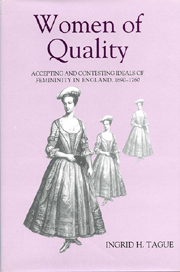Book contents
4 - Household Management
Published online by Cambridge University Press: 12 September 2012
Summary
When Lady Cassandra Willoughby's brother invited her in 1687 to live with him and oversee his household, she was happy to accept. “This proposal I was much delighted with,” she recalled three decades later, “thinking it would be no small pleasure for me to be M[ist]r[es]s of Wollaton, and to doe whatever I had a mind to, believing that such a government must make me perfectly happy.” Her comment that she looked forward to the “government” of Wollaton Hall, with its connotations of power, draws attention to the special place that household management held in the lives of many women. Moreover, her brother's invitation reflects the common assumption that households required the presence of women; lacking a wife, he offered the job to his sister. Household management was widely accepted as the proper domain for female authority.
Women's domestic activities thus provide important information about their social roles. Some historians have seen the early eighteenth century as marking the end of many women's productive capacity in the household; the rising middle class, so the argument goes, sought to demonstrate its new status through the leisure of its women. Inherent in this argument is the assumption that aristocratic women already occupied unproductive roles. But other scholars have drawn attention to the domestic realm as a site of power for women, even suggesting that for elite women, rank could overcome the handicap of gender as they exercised authority over their servants or other social subordinates.
- Type
- Chapter
- Information
- Women of QualityAccepting and Contesting Ideals of Femininity in England, 1690–1760, pp. 97 - 132Publisher: Boydell & BrewerPrint publication year: 2002

